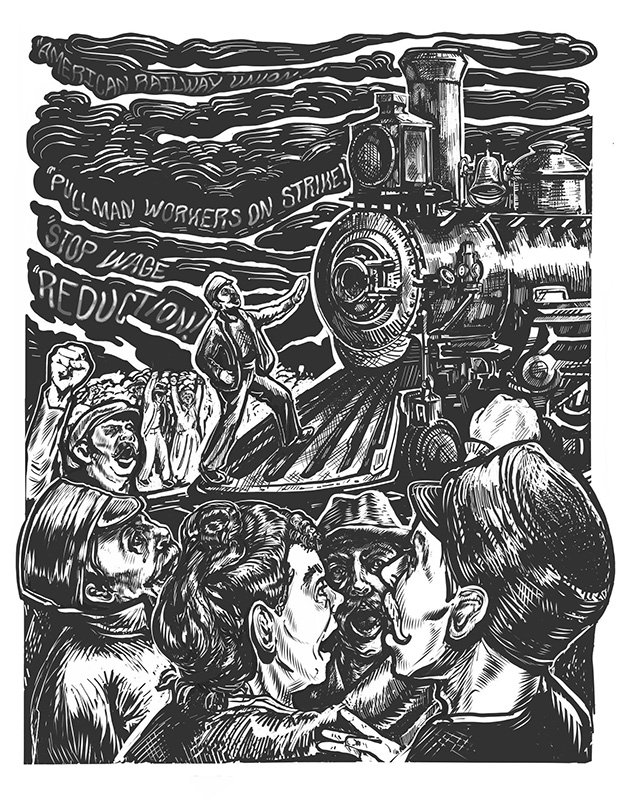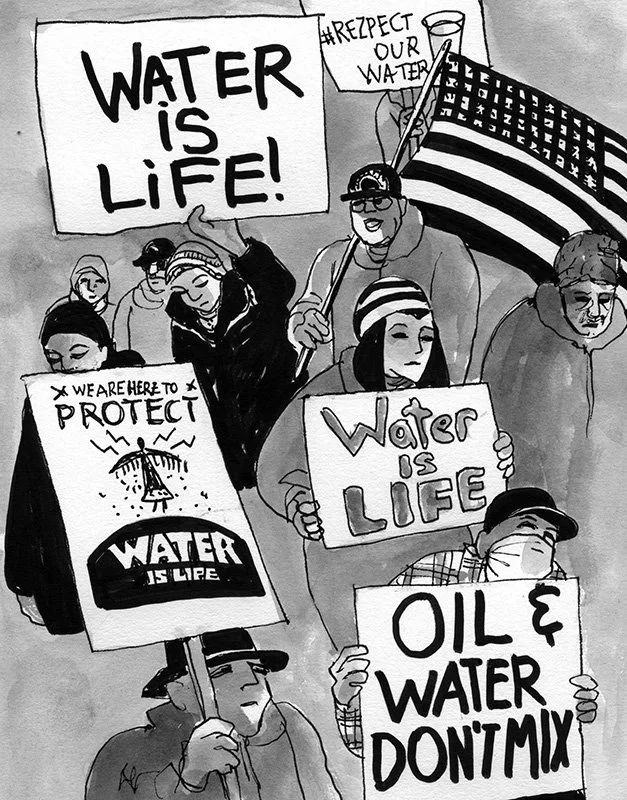Welcome to Verdict Magazine
Listed below is only a brief synopsis of some of the thousands of insightful articles published in Verdict magazine. To read the full articles, contact NCCLP. You can also join as a member, volunteer, become a subscriber or participate in a myriad of other ways to help advance our cause.

The Legacy of Slavery
October 2021
Sidebar
History of the black codes followed by the Jim Crow laws that continued the enslavement of Black people in the South after the passage of the Thirteenth Amendment purportedly freeing the slaves.

Overcoming Legal Strangleholds on Public Employees
By Albert Van Lare, Esq.
April 2021
In a January 15, 2021 presentation to members of the Professional Staff Congress at City University of New York, the author discussed the implications of New York’s public employees law, and particularly its no-strike clause, on unions and their members. The article speaks to the need to organize in the face of the law’s restraints against labor.

Justice for Indigenous Leader Milagro Sala
By Matías Duarte, Argentinean Attorney
April 2021
In 1999, indigenous leader Milagro Sala founded Túpac Amaru Neighborhood Organization in Argentina’s Jujuy province in response to extreme poverty in the region. Its highly successful collective project built housing and implemented social policies to benefit the most vulnerable. The author details the illegality and injustice in the multiple prosecutions mounted against Ms. Sala, directed at stopping the organizing of the largely indigenous population.

Toxic Genocide in Bayview-Hunters Point
By Ahimsa P. Sumchai, M.D.
April 2021
The former U.S. Naval shipyard in the Bayview-Hunters Point (BVHP), San Francisco is contaminated by toxic waste. The Navy was responsible for cleaning up this Superfund site, which threatens the health of local residents. Instead, they hired a company that lied about the clean up. This article discusses the campaign, including a class action lawsuit, by area residents to obtain recourse. Bay Area CCLP, located in BVHP, has been organizing for legal recourse for the residents for over two decades.

Business Interruption Insurance in the Era of COVID-19
By Racquel Brown-Gaston, Esq.
January 2021
Almost 100,000 small businesses have closed in the United States due to the impact of the COVID-19 pandemic; 60% will never reopen. Despite many small businesses having paid high premiums for business interruption insurance, insurers are denying most claims for losses due to the pandemic and the courts are allowing it. This article traces the development of insurance law and how the insurance companies take the money and run.

Solidarity in Danger
By Nelson Lichtenstein, Ph.D.
January 2021
In an industrial dispute that started over two jobs on the Portland, Oregon docks, a federal jury last year awarded an employer $93.6 million, a judgment large enough to bankrupt the International Longshore and Warehouse Union. At the core of the case is the Taft-Hartley Act’s prohibition of labor protests, strikes and boycotts that are “secondary” to a dispute rather than “primary.” As the author, a labor expert, explains, we live in a world of fissured employment and any effort to mount an effective work stoppage or boycott will necessarily impact a “secondary” employer and its employees. If this verdict is upheld on appeal, it will provide a roadmap for any employer who seeks to eviscerate the solidarity and mutual support that stands at the heart of trade union power.

Fighting for the Rule of Law
By Dr. Eugenio Raul Zaffaroni, Argentinian judge emeritus
October 2020
International law is not something most Americans know well; yet certain fundamentals are central to the values upon which our nation was built. The idea of tyrannical rule, where people are afraid for their lives from the government, is abhorrent. Dr. Eugenio Raúl Zaffaroni, the preeminent Argentine jurist, analyzes the misuse of power in Bolivia in the actions surrounding the November 2019 coup d’etat. Seven top officials of the ousted government were granted political asylum in Mexico, but the coup regime illegally refused them safe passage out of the country. Dr. Zaffaroni declares that recovering, restoring and developing the Rule of Law in Bolivia constitutes a critical task in Latin America.

Thirsty for Justice: The Fight for Safe Drinking Water
By Debi Ores, Esq.
October 2020
A 2012 California law provides that safe, affordable drinking water is a human right, but the author, a water advocate, details how infrastructure is lacking or non-existent; groundwater is contaminated with unregulated industrial carcinogens; many small water systems are unsustainable; and costs are sharply rising. As a result, a million Californians lack adequate, safe and affordable drinking water. The author calls for California to develop solutions to this life-threatening situation.

Mythologies of Worker Rights
By Michael E. Tigar, Esq.
April 2020
The author examines myths perpetrated throughout history on workers’ rights in the U.S.; for example, the myth that U.S. workers can freely bargain for their wages. He points out that whatever right workers have had to withhold consent to low wages, it has been an individual right. When workers unite to attempt to increase their bargaining power, they are called conspirators.

Dissecting a False Prosecution: The Central Park Five Case
By Eric A. Seiff, Esq., and Marc Ramirez, Esq.
January 2020
Public defender and New York State CCLP member Marc Ramirez, Esq., interviews NYS CCLP volunteer Eric Seiff, Esq., attorney for Central Park Five defendant Korey Wise on the successful motion that overturned the convictions of the five young men. Mr. Seiff discusses the devastating miscarriage of justice in the high-pressure, rush-to-judgment atmosphere in New York City.

The Crisis of Wage Theft
By Nina J. Baumler, Esq.
October 2019
U.S. workers are cheated out of $50 billion every year in a crisis of wage theft, which impacts workers who can least afford it. The author explains the causes, including the failure of state and federal agencies to enforce minimum wage and overtime laws. Ms. Baumler calls for greater awareness of the epidemic of wage theft and for the government to exercise the political will to change the situation.

Sixty Years On — Cause for Pause
By Stephen R. LaCheen, Esq.
October 2019
A well-known criminal defense attorney analyzes changes he has witnessed in the criminal justice system over 60 years of law practice. Mr. LaCheen argues that the War on Drugs and War on Crime claimed a crime wave and used the hysteria the media generated to ramp up penalties; the result was a dramatic increase in the prison population and the decimation of a generation of African-American men. As for the new prison reform law, he notes its impact remains to be seen.

Epic Systems Corp. v. Lewis: A Nail in the Coffin for Employee Rights
By James C. Sturdevant, Esq.
October 2018
In a recent decision, the U.S. Supreme Court held that the Federal Arbitration Act and individual arbitration agreements override all federal labor law, including collective action under the National Labor Relations Act. The author, a noted consumer law expert, discusses how the decision is part of a larger effort to dismantle the civil justice system, limit worker access to the courts, limit class actions and block attempts to protect individuals from overreaching corporate entities.

The U.S. Naval Base at Guantánamo: A Violation of International Law
By Dr. Dorys Quintana Cruz
April 2018
The author outlines numerous grounds in international law for voiding U.S. possession of territory within the confines of Cuba. She argues that the treaties through which the United States established the naval base at Guantánamo are so vitiated that they have become invalid as legal instruments and U.S. possession should be ended.

Confrontation at Standing Rock: The Future of Indigenous Resistance in the United States
By James W. Zion, Esq.
April 2017
The protest led by indigenous peoples against the construction of the $3.8 billion, 1,172-mile Dakota Access Pipeline has drawn tens of thousands of “water protectors” from across the U.S. In the words of author James Zion, Esq., it “is the culmination and a symbol of the long history of insults to Indian lands, rights and traditions.” Zion, a Native American law expert and member of NCCLP ‘s Board of Directors, frames this battle in the ongoing and historical activism of Native Americans, fighting to preserve Indian lands, rights and traditions against larceny for profit by large corporations, insulated from liability by government policy.

Unjust Migratory Policy in the European Union
By Dr. Leyla Carrillo-Ramirez
October 2016
The European Union’s Schengen Agreements provide for free travel within the Union. With an unprecedented flood of refugees entering Europe due to manmade and natural disasters, Dr. Carrillo documents the EU’s violations of both EU founding principles and numerous international laws and treaties, depriving refugees of fundamental human rights

It is the Time for Deeds ...
By Ambassador Robert Van Lierop
October 2016
The author’s presentation at the United Nations on June 30, 2016 to the High-Level Global Migration Group (GMG) Multi-Stakeholder Meeting spoke to the need to act according to law and humanity on the refugee plight caused by war, climate change and other disasters.

Combining Legal and Organizing Tactics to Achieve a Goal
By Kathleen M. Paolo, Esq.
January 2016
NCCLP Operations Manager recounts how it has grown from one organization in Sacramento California, dealing with the legal needs of organizing drives of the lowest-paid and least-protected workers in the United States, to a nationwide effort, including a publication of national repute, through its method of combining legal work with organizing on an all-volunteer basis, without government or strings-attached funding, setting precedents in the face of our two-tiered legal system (one for the wealthy and one for everyone else.)

“Vulture” Loans Threaten Developing Nations
By Amanda Reid, Esq.
October 2015
When an individual, a corporation, a city, or even a state is unable to pay its debts, it can file for bankruptcy and restructure the debt. Not so for nations. When Argentina defaulted in 2001 and then successfully issued new debt for old, a handful of well-connected investors swooped in, bought the old debt for pennies on the dollar and obtained a judgment giving them a 1600+% profit and forcing what one U.S. judge called a default, while a British court has declared the U.S. judge and bank responsible. The Argentineans called the investors “vultures” for obvious reasons. Less obvious is the fact that, as the U.S. government has argued, this court decision undermines the dollar itself as currency for international trade, and it threatens the U.S. economy itself. Find out why.

Will There Be Any Process Servers Left in New York City?
By Irving Botwinick
October 2014
A master of the art of process serving, the author reflects on the impact of New York City regulations governing process servers, which increase their burdens.

